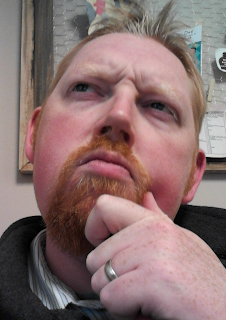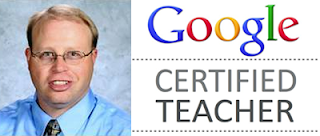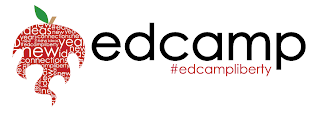Tuesday, April 29, 2014
C4T April
C4T April #1
Meet Steven Anderson
He is from Winston Salem, North Carolina and you need to visit his blog to view his long list of credentials. His passion for technology far outweighs mine and his list of credentials gives me credential envy.
What excited me most was his blog post from Friday, April 11, 2014. My last C4T was Eric Langhorst. Eric had a post about Edcamps. So when I visited Steven's blog and saw his post about Edcamps, I was intrigued. The particular Edcamp Steven was discussing is Edcamp USDOE. Now that sounds fun. Edcamps are know as "unconferences" where the schedule is created as attendees arrive and decide what they want to discuss that particular day. This site contains a video that explains how Edcamp is run. A list of upcoming Edcamps can be found at the Edcamp Wiki. I want to attend the Birmingham and New Orleans events. And just in case you were wondering, the most party time I would have in New Orleans is a cup of coffee and chicory with a plate of beignets.
The post Steven had April 13, 2014 was about Sphero. This is the next phase of augmented reality. The sphero is a game, personal trainer, programming teacher and babysitter in one. Steven was excited about the potential shpero has to teach children how to build programs. I know nothing about building programs, but see the value in students being proficient in this skill. Steven's blog contains a link to other videos and information about sphero.
C4T April #2
So,What has been one of the easiest, most versatile tools I have come across this semester? Well, YouTube, of course. I was happy to see that Mr. Anderson also found YouTube to be a great tool. I was able to find tools on how to edit in YouTube on Eric Langhorst's website. Some of those mentioned in Mr. Anderson's most recent blog post were new to me. Quiet Tube lets you watch videos without all the commercials and crap. Tube Chop lets you clip only the portions of video you need for presentations or lessons. Drag On Tape lets you add video upon video as you create custom video clips. Watch2gether lets you create private viewing rooms where you can have visitors watch videos together. This is great for collaborative projects.
YouTube is accessible to virtually every person with internet access. Why wouldn't I be excited to teach children how to do more than put "Wisdom Tooth Extraction" videos on YouTube. YouTube gives students the ability to express what they have learned across all curriculum and receive real feedback. Now, these new tools will help them produce quality videos instead of a quantity of crap. These tools will also enable me to present valuable explanations, investigations and illustrations without all the extra junk, including commercials and inappropriate images after the selected video ends.
I hope Mr. Anderson hears the collective sigh of relief from teachers and parents for giving us these great tools. Thank you!
Saturday, April 26, 2014
C4K April 2014
C4K April #1
Meet Alizhay
Alizhay is a 6 year student at the Pt. England School in Auckland, New Zealand. She has been taking swimming lessons at school. It seems as if these lessons are part of the schools curriculum. This would certainly be an exciting physical education class. She explained that she was learning the free style stroke by using flutter boards and practicing rocket arms. She is also competing in relay races. This is an "exhausting" event for her. I shared the link to our family's swim team with her. I hope she gets to visit the site.
C4K April #2
Meet Samoa
Samoa is a 4 year student at Pt. England School in Auckland, New Zealand. She recently completed a reflection post about Chromebook. She was very honest about what she enjoyed, disliked and could have done better. What was most encouraging to me was that she willingly admitted the positive and negatives to the use of this technology. I need to take this into account with my children and future students. This type of feedback will help make me a better teacher. Listening and learning are huge parts of teaching.
Meet Alizhay
Alizhay is a 6 year student at the Pt. England School in Auckland, New Zealand. She has been taking swimming lessons at school. It seems as if these lessons are part of the schools curriculum. This would certainly be an exciting physical education class. She explained that she was learning the free style stroke by using flutter boards and practicing rocket arms. She is also competing in relay races. This is an "exhausting" event for her. I shared the link to our family's swim team with her. I hope she gets to visit the site.
C4K April #2
Meet Samoa
Samoa is a 4 year student at Pt. England School in Auckland, New Zealand. She recently completed a reflection post about Chromebook. She was very honest about what she enjoyed, disliked and could have done better. What was most encouraging to me was that she willingly admitted the positive and negatives to the use of this technology. I need to take this into account with my children and future students. This type of feedback will help make me a better teacher. Listening and learning are huge parts of teaching.
Sunday, April 20, 2014
Blog Post #13 What Did Dr. Strange Miss?
What in the wiki are you talking about?
I think most people have heard about Edward Snowden's infamous "Wiki Leaks". I assumed the term "wiki leaks" was simply the 21st century word for a Benedict Arnold. Then I began looking into the blogs of the C4Ts Dr. Strange assigned, and the term "wiki" kept being mentioned. I was curious but nothing more. I was actually glad he did not make us dig deeper into the word and whatever a wiki was. The irony in all of this is that because he did not directly assign our class to explore wikis, I am doing it on my own. Ha! At the beginning of EDM 310 I thought having a wiki would involve an extensive background in computer science. Surprise, it is as simple as pie. It is as easy as creating a Facebook page or establishing a new email. In fact, it IS easier than having your tag renewed at the end of the month.
I first began searching Google. I came across Barbara Feldman who included a list of possible options. However, because I seem to have a "virus" that keeps putting pop ups on my screen I had to abandon her list. I was able to read her suggestions, but it was difficult to do much else. The site is worth visiting. I went back to Google and found Wiki Spaces. For me, this was the jackpot. I signed up and created my very own Wiki! It was painless, quick and easy.
Barbara Feldman explained that wikis can be used personally and professionally. They can help organize family photos, decide who is bringing Grandma's famous cornbread to Thanksgiving dinner or establish a classroom communication board. As long as those needing access to the wiki have a computer with internet access collaboration and communication are possible.
I thought one of the best uses for a class wiki, to begin with, would be to introduce myself, give class news, lists of assignments/homework, establish a calendar and have parents easily access the activity in the classroom. My wiki is a beginning work, with lots of room for growth, but I am excited to see what I can do. I think creating a wiki is going to be alot like learning to blog. I will make some mistakes, but the benefit will be a tool that is accessible for each parent, student and administrator. Parents and I will not have to worry about newsletters getting lost on the bus, I will not have to remember to pass any extra papers out, and students who are absent will know what is happening in the classroom. This class wiki will take shape as I grow, get a real class, and we begin learning.
I think most people have heard about Edward Snowden's infamous "Wiki Leaks". I assumed the term "wiki leaks" was simply the 21st century word for a Benedict Arnold. Then I began looking into the blogs of the C4Ts Dr. Strange assigned, and the term "wiki" kept being mentioned. I was curious but nothing more. I was actually glad he did not make us dig deeper into the word and whatever a wiki was. The irony in all of this is that because he did not directly assign our class to explore wikis, I am doing it on my own. Ha! At the beginning of EDM 310 I thought having a wiki would involve an extensive background in computer science. Surprise, it is as simple as pie. It is as easy as creating a Facebook page or establishing a new email. In fact, it IS easier than having your tag renewed at the end of the month.
I first began searching Google. I came across Barbara Feldman who included a list of possible options. However, because I seem to have a "virus" that keeps putting pop ups on my screen I had to abandon her list. I was able to read her suggestions, but it was difficult to do much else. The site is worth visiting. I went back to Google and found Wiki Spaces. For me, this was the jackpot. I signed up and created my very own Wiki! It was painless, quick and easy.
Barbara Feldman explained that wikis can be used personally and professionally. They can help organize family photos, decide who is bringing Grandma's famous cornbread to Thanksgiving dinner or establish a classroom communication board. As long as those needing access to the wiki have a computer with internet access collaboration and communication are possible.
I thought one of the best uses for a class wiki, to begin with, would be to introduce myself, give class news, lists of assignments/homework, establish a calendar and have parents easily access the activity in the classroom. My wiki is a beginning work, with lots of room for growth, but I am excited to see what I can do. I think creating a wiki is going to be alot like learning to blog. I will make some mistakes, but the benefit will be a tool that is accessible for each parent, student and administrator. Parents and I will not have to worry about newsletters getting lost on the bus, I will not have to remember to pass any extra papers out, and students who are absent will know what is happening in the classroom. This class wiki will take shape as I grow, get a real class, and we begin learning.
Friday, April 18, 2014
Blog Post #12 Assistive Technology
This presentation includes an introduction to Voice Assistant, Dragon Dictation and Natural Reader. These apps and programs are capable of assisting students with vision and hearing impairments within the classroom and real world settings. Please view this presentation on my Google Site.
Sunday, April 13, 2014
Sunday, April 6, 2014
Blog Post #11
The following conversation is presented by Group Las Vegas after watching a series of videos by Brian Crosby, Paul Anderson who also recommends watching Blended Learning Cycle, Mark Church, Sam Payne, Dean Shareski, and Roosevelt Elementary's PBL Program.
Thursday, April 3, 2014
Wednesday, April 2, 2014
C4T March
C4T #3 Post #1
Meet Eric Langhorst What a fascinating blog Eric Langhorst has set up! He must have the heart of Dr. Strange. Two videos from YouTube greeted me, and I liked what they taught. He taught me how to edit videos I have uploaded to my YouTube account. The tutorials teach how to add music over a video, how to change effects, add captions and how to stabilize videos. He gave me an idea for Blog Post#13.
He also presented a slide show called Bring the Maker Revolution to Your Classroom. I thought it was interesting that Mr. Langhorst, a history teacher, was excited about electronics. The idea behind the Maker Movement seems to be creativity across the curriculum. I thought about how this program incorporates art into each subject. I will look deeper into cardboard creations. I was excited to gain another resource both in technology and art.
Eric has an extensive list of YouTube editing and curating tutorials on YouTube. The two I have included are only a sample. I really encourage you to check these out. Like I mentioned earlier, he has given me an idea for Blog Post #13.
Editing Audio Tutorial
Editing Video Tutorial
C4T #3 Post #2
I had to go back in time to January to find this blog post. Mr. Langhorst introduced me to Edcamps. I looked at various blogs and Twitter to figure out how to best describe Edcamps. As teachers, Professional Development is necessary. I have only attended "workshops" offered by Mobile County Public School Systems. These were day long events during which we were taught various ways to teach content. It was primarily lecture based with some demonstration. Mr. Langhorst describes professional development conferences as being lecture based also, consisting of lots of sitting and listening. Boring. When he began to describe the Edcamps his tone changed. Edcamps are similar to typical PD conferences in that educators learn how to apply technology and other teaching methods in their classrooms. The major difference is that the Edcamps are FREE, there are no scheduled sessions and no corporate agendas. These camps are grass roots based sharing of ideas, skills, lessons and pleasure related to teaching. Agendas are not agreed to months prior to the camp. Rather, those attending are at liberty to share ideas, apps, or techniques they are passionate about. Lots of conversation and discussion takes place and small amounts of lecturing occur.
I do not know for certain, but I think individual areas or districts can organize their own Edcamp. I have not seen one for the Mobile area, but there is one in Birmingham, Alabama and New Orleans. I am waiting on a reply from Amanda Dykes. She is one of the organizers of the Birmingham Edcamp. I want to know if education majors could attend the camp.
It is interesting that Mr. Langhorst noticed how Edcamps are filled with conversation and discussion rich events. "Isn't this what we want our classrooms to look like," he asks.
Meet Eric Langhorst What a fascinating blog Eric Langhorst has set up! He must have the heart of Dr. Strange. Two videos from YouTube greeted me, and I liked what they taught. He taught me how to edit videos I have uploaded to my YouTube account. The tutorials teach how to add music over a video, how to change effects, add captions and how to stabilize videos. He gave me an idea for Blog Post#13.
He also presented a slide show called Bring the Maker Revolution to Your Classroom. I thought it was interesting that Mr. Langhorst, a history teacher, was excited about electronics. The idea behind the Maker Movement seems to be creativity across the curriculum. I thought about how this program incorporates art into each subject. I will look deeper into cardboard creations. I was excited to gain another resource both in technology and art.
Eric has an extensive list of YouTube editing and curating tutorials on YouTube. The two I have included are only a sample. I really encourage you to check these out. Like I mentioned earlier, he has given me an idea for Blog Post #13.
Editing Audio Tutorial
Editing Video Tutorial
C4T #3 Post #2
I had to go back in time to January to find this blog post. Mr. Langhorst introduced me to Edcamps. I looked at various blogs and Twitter to figure out how to best describe Edcamps. As teachers, Professional Development is necessary. I have only attended "workshops" offered by Mobile County Public School Systems. These were day long events during which we were taught various ways to teach content. It was primarily lecture based with some demonstration. Mr. Langhorst describes professional development conferences as being lecture based also, consisting of lots of sitting and listening. Boring. When he began to describe the Edcamps his tone changed. Edcamps are similar to typical PD conferences in that educators learn how to apply technology and other teaching methods in their classrooms. The major difference is that the Edcamps are FREE, there are no scheduled sessions and no corporate agendas. These camps are grass roots based sharing of ideas, skills, lessons and pleasure related to teaching. Agendas are not agreed to months prior to the camp. Rather, those attending are at liberty to share ideas, apps, or techniques they are passionate about. Lots of conversation and discussion takes place and small amounts of lecturing occur.
I do not know for certain, but I think individual areas or districts can organize their own Edcamp. I have not seen one for the Mobile area, but there is one in Birmingham, Alabama and New Orleans. I am waiting on a reply from Amanda Dykes. She is one of the organizers of the Birmingham Edcamp. I want to know if education majors could attend the camp.
It is interesting that Mr. Langhorst noticed how Edcamps are filled with conversation and discussion rich events. "Isn't this what we want our classrooms to look like," he asks.
Subscribe to:
Posts (Atom)




